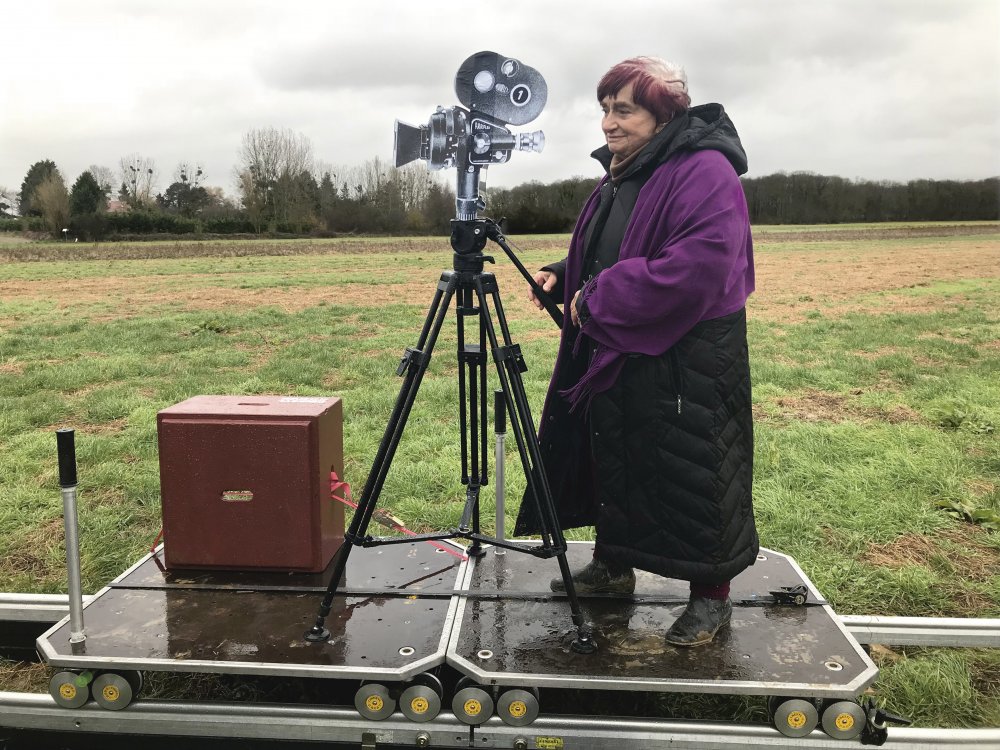In her final film Varda by Agnès - originally a two-part retrospective for French television, repackaged for theatrical distribution after her death this March - Agnès Varda puts herself first. Varda's penultimate film, Faces Places, looked out onto the wider world, aware as its maker was that her sight was failing. (There was a poignancy in the way Varda reached out to a younger photographer, JR, to assist her in her looking.) Now, she comes indoors, filling a series of venues converted for one night only into a lecture theatre, in order to regale both fans and students - and those of us watching on from the cheap seats. It's first and foremost a legacy project: Varda undertaking to put herself on the record about her art, her life and where the two have coincided, in much the same way she might have done being interviewed for one of Faber & Faber's filmmaker-on-filmmaker books, or on Mark Cousins' much-missed Scene by Scene series. The subject outlines the three watchwords of her art ("inspiration, creation, sharing"); she talks freely about how she strove, where possible, to mesh the fictional with elements of documentary. Yet something about the theatrical framing - Agnès looking out on friends, family and filmlovers - also recalls ITV's An Audience with..., the primetime showcase by which such showbiz veterans as Les Dawson and Bruce Forsyth came to enjoy one last hurrah, while basking in the praise of their peers - an indication of the extent to which Varda, at the time of her passing, had been enshrined among the most revered and most accessible of arthouse auteurs. Even as she neared ninety years of age, people turned out for her.
This was the great miracle of Varda's career: though she dabbled in popular genres, and was even tempted out to work in Hollywood in the 1960s, her renewed visibility can be specifically traced to a series of personal essay films - 2000's The Gleaners and I, 2004's Cinevardaphoto, 2008's The Beaches of Agnès - of the kind more readily associated with her sometime New Wave cohort Jean-Luc Godard. The success of these films was down to a mode of address more open than the oblique Godard has typically allowed for, more curious than clinical: as Varda insists here, "Nothing is trite if you film people with empathy and love", and she describes inserting herself into her films as necessary "to be with the audience". Godard has tended to hide behind his images, as he has behind his darkened specs; Varda saw herself as a travelling companion, someone who might gently point a few things out to us. (The former's failure to open his front door to Varda at the end of Faces Places now seems a definitive parting of ways, a fork in the cinematic road.) That process of redirection continues into Varda by Agnès, an essay-film on the subject of those earlier essay-films, and more besides. Long-term admirers will gain, for one, a new way of looking at 1985's Vagabonde; newcomers showing up wondering why this director was so revered should find some answer in clips that are gorgeously restored (we may have forgotten how colourful this oeuvre was), presented in the right ratio (not always a given in filmed retrospectives) and chosen to illustrate the enormous scope - embrace feels more Varda-appropriate - of this filmography. (Ideally, everyone who bought a ticket would be handed a boxset of the collected works on the way out, but that may be an indulgence beyond an arthouse distributor in the current economic climate.)
In and of itself, the film is a patchwork, pieced together from several months' (perhaps years') worth of lectures, taped interviews and other public appearances; it's often unclear whether Varda is making a point under her own steam, or responding to audience questions. "We'll jump around," she shrugs early on, giving the film whatever editorial licence it requires. Still, wherever she lands, she generally lands on something of interest: her testimony encompasses both dissection of specific details from individual titles - you realise how cinema provided a form of memory to this octogenarian woman - and conversation that goes to some wider philosophy of life ("I've learnt that recycling brings joy"). In Faces Places, Varda confessed she was unafraid of death, on the transcendentally simple grounds that "that'll be that". The final images she sets before her audience are drawn from that film, outtakes from the sequence that found Varda and JR vanishing amid the shifting sands of one of her signature beaches: "disappearing into the blur", as her newly recorded voiceover puts it, or perhaps returning to dust. Tears might well be shed for Varda's passing at that point ("I'll leave you," she signs off, after so many years of being with us), yet how many female creatives have rounded off a sixty-year career with a film in which they themselves get to direct their audience's gaze, and indeed to have the last word? The industry initiatives presently being set in place may ensure that number rises over the decades to come, if there's still a world for those women to film. For now, though, as this fondest of valedictions makes clear, there's only one Agnès Varda.
Varda by Agnès is now playing in selected cinemas, and streaming via the BFI and Curzon Home Cinema.

No comments:
Post a Comment